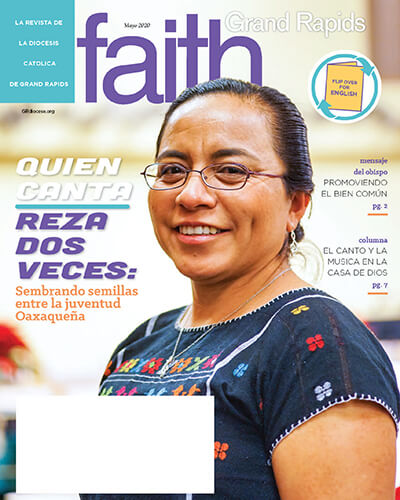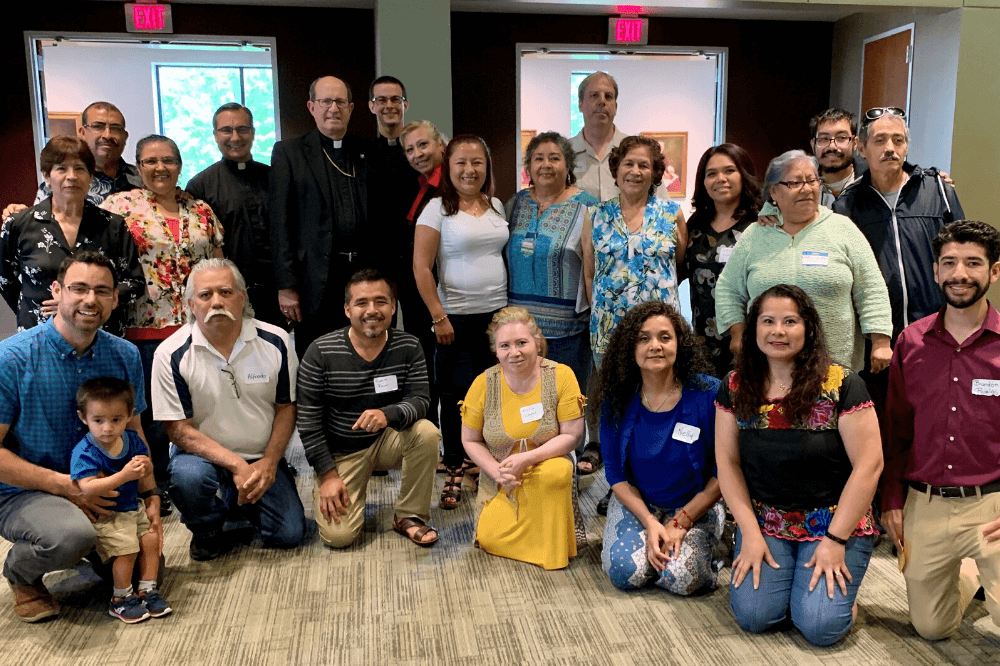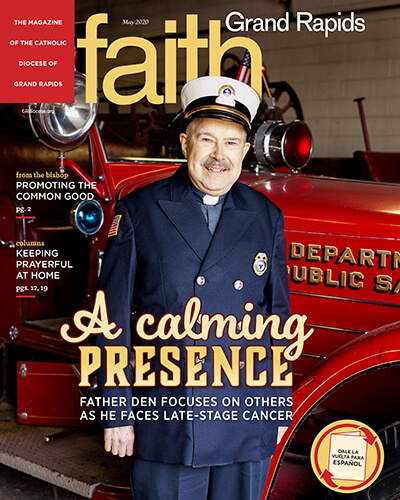
By Juan Carlos Farias
There is a beautiful statement attributed to St. Augustine that says: “The one who sings prays twice”. I haven’t read all the literature of St. Augustine, but so far I haven’t come across this phrase. What I did find in one of his Commentaries to the Psalms, specifically Psalm 72, was the following very similar and profound paragraph: “Whoever sings a praise, not only praises, but only praises with gladness. He that sings praise, not only sings, but also loves him of whom he sings. In praise, there is the speaking forth of one confessing; in singing, the affection of one loving.”
A trajectory for the path of music
On this occasion, we present the Oaxacan musician Pomposa Aragon, born in Santa Maria Zoquitlan from Valles area. She has come to share her musical talent with young natives of Oaxaca families that are parishioners of Holy Name of Jesus Parish. When I asked her if she could share something about herself, she replied: “Since the age of 17, I went out to study in the City of Oaxaca at the School of Fine Arts at the Autonomous University Benito Juarez. After that I went to Jalapa Veracruz to do a Bachelor’s degree in Music Education, which focused on the pedagogical and methodological teaching of music. There, I was able to do a specialization on Saxophone which was the instrument that has excited me to this day. In 2009, I returned to the capital city of Oaxaca after finishing my two bachelor’s degrees and joined the State Band and continued there for three more years. In 2012, I went to Tuxtla Gutierrez city in Chiapas to teach for the Intercultural University of Chiapas (UNICH) and in 2014, I was part of the auditions for the Symphonic Band of the Mexican Navy where I was successfully recruited. Taking advantage of my stay in Mexico City, I was accepted to the National Conservatory of Music where I have continued to specialize and prepare myself.”
We know that Oaxaca is a very rich in traditions, languages, gastronomy and with great religious devotion. One can look at the Oaxaca map and find that a great number of towns use the name of a patron saint preceding the name of the city, for example, St. John the Baptist Tuxtepec, Holy Cross Xoxocotlan, St. Mary Chicometepec, or St. Michael Suchixtepec. In fact, there is a song that is considered as the emblematic anthem of Oaxaca State, “Dios nunca muere (God Never Dies)” that indicates a great truth and attribute of God, His eternity. This song affirms with such vehemence that eternal life is only found in God and that only in Him our peace and our well-being: “I will leave behind the things I love, the ideal land of my birth. I know that later I shall enjoy the joy and peace that in God I shall find.”
Accompanying Oaxacan religious and cultural traditions
During our dialogue, we asked Pomposa what are some of the most deeply rooted cultural and religious traditions in Santa María Zoquitlán, and here is her answer: “Some of the most deeply-rooted traditions in my Oaxacan land are weddings, fifteen years, and baptisms because the expense that is made during these celebrations is extremely large. For example, during a wedding there is a day that we call “day for help.” The community gathers and helps to prepare meals, and music plays a key role because through the songs family members are invited to dance and celebrate the joy we are feeling. Music for me is an internal satisfaction, it is like food that we have because the material comes and goes, but music moves our spirits and emotions. Furthermore, it is a great satisfaction when I see the faces of the children excited to learn about the music and instruments of their culture. They find in music motivation for life, and they like to continue learning and discovering their own roots and culture. Traditional Oaxacan music is what gives us our identity, and what we have inherited from our ancestors. Without a doubt, this music teaches deep cultural and religious values, and it is necessary to take them to the youth, so they learn what it really means”.
Catholics and musical expression
For us as Catholics, music in the Church is a spiritual source, which touches the deepest part of the spirit, connecting with faith. Our songs refer to that divine mystery, to Christ who was in our midst announcing the Kingdom and inviting a change of life. For the Oaxacan community, religion is essential because of the relationship it implies with God. Therefore, Pomposa emphasizes: “The wedding revolves around the religious, that God blesses this union and the community rejoices in thanks for it. That is why we participate by celebrating in an exaggerated way, because it is a joy expressed in an effusive and expressive way.”
Young people of Oaxacan descent, born here in the United States have already been influenced by American culture, but their fathers and mothers also have something to contribute to them. That is why they organize themselves in this type of group, so that their families continue to learn and rescue the values from their ancestors. In fact, part of the mission of fathers and mothers is to continue to instill those values of language, culture, religion, and ancestral traditions. If one day they return to the land of their parents, they will be able to understand the value of the community. They will be able to celebrate and share what they give and offer from their hearts since the value of the generosity and unity of the people is something that is priceless.
A trip to fall in love with music
The trip had a very clear objective: to help young people born here, of Oaxacan fathers and mothers, fall in love with the rich musical traditions of that state. We know from psychology that the stage of adolescence and youth is a period of search for identity that will mark them for the rest of their lives. With this visit Pomposa is sowing seeds of the Oaxacan culture where we find characters who have left a deep mark on the history of Mexico such as Benito Juárez, Porfirio Diaz, the Flores Magón brothers, the poets José Lopez Alavez and Macedonio Alcalá who have written songs such as the Mixtec Song and God Never Dies respectively, along with the philosopher and writer José Vasconcelos, the painter Rufino Tamayo among other greats. So, she ends by affirming: “Music has such a special magic that it changes the individual’s being, their attitude toward life. Through it there is satisfaction and internal stability. Music saves people from situations with extreme spiritual and economic needs, providing them with motivations to get ahead, and that is what we try to transmit to these young people, the secrets of music. Thus, we can identify among them a good musician, writer or interpreter of our culture, and that perseverance and discipline are the necessary conditions to fulfill the objectives of this life.”
This is the English translation of the Spanish cover story from the May 2020 issue of FAITH Grand Rapids magazine.



